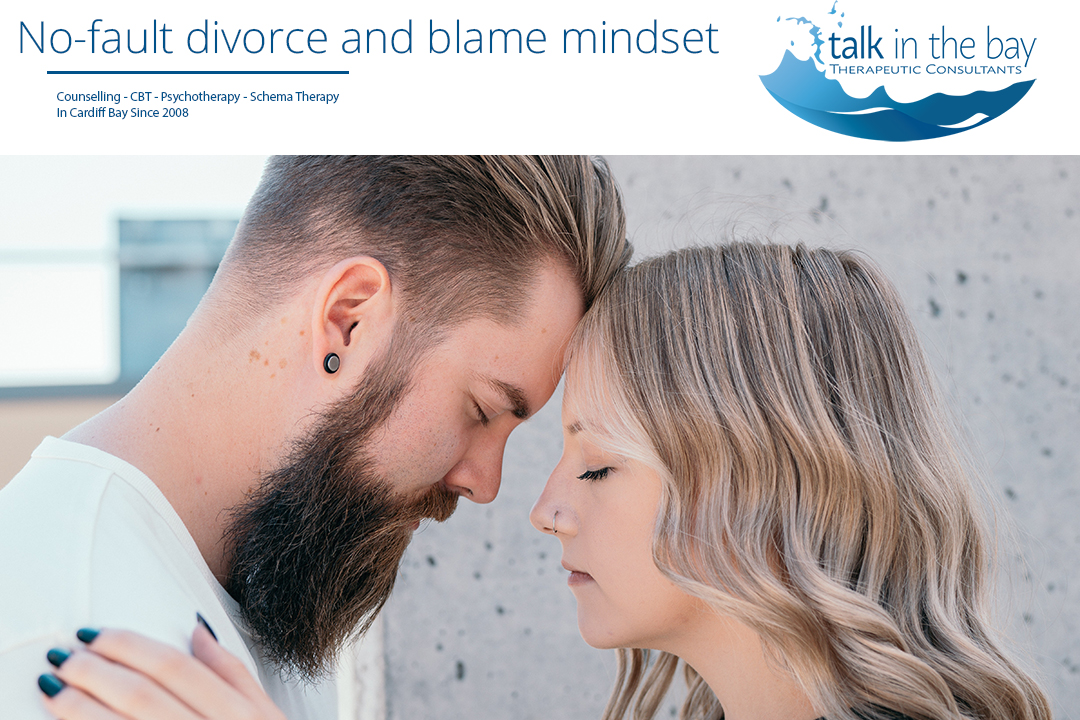Blame can have great psychological power over us, particularly when it’s used in a relationship. However, in a divorce court, who’s said to be at fault for a marriage breaking down has very little to no bearing on the outcome.
In this article, we explore the recent introduction of ‘no-fault’ divorce in the UK and discuss how blame works and whether it’s a helpful strategy.
We’ll also explain how therapy can help you achieve the most positive outcome for a relationship before it reaches a divorce situation – and the thoughts and behaviours that can help bring about peace and reduce conflict even after separation.
Previously, when couples were divorcing, one spouse was forced to make accusations about the other’s conduct – for example, citing ‘unreasonable behaviour’ or adultery. Or couples had to have been separated for many years before they’d be granted a divorce.
In April of this year, the government introduced the option of a no-fault divorce. This means that a spouse or couple can now apply for a divorce by saying that their marriage has broken down irretrievably – removing blame from either one.
The newly reformed divorce act also introduces a minimum timeframe of 20 weeks between the proceedings starting and when individuals can apply for a conditional order of divorce.
This helps provide time to reflect, seek professional therapy, and potentially also gives couples space to change their minds.
Removing blame from divorce
It’s always painful when relationships get into difficulty. And the patterns of dialogue and behaviour we sometimes fall into can quickly cause things to fall into a spiral of resentment.
These patterns can cause us a lot of hurt and pain, as well as affect those around us, like our children and wider family and friends.
The recent introduction of ‘no fault’ divorce aims to put emotions around blame to one side – for a cleaner, faster and more simplified approach to formal separation.
But although blame can encourage unnecessary tension and conflict,
this doesn’t mean a no-fault divorce is a no-feeling divorce
because the breakup of any relationship can still cause emotional turmoil.
Why do we blame other people?
While we’re often happy to take credit for the positive situations we contribute to, it’s much harder to put our hand up when things aren’t going so well.
This is where we often reach for blame.
Blaming others is a way of diverting attention away from ourselves. It can stop us feeling vulnerable and can make us feel like we have some control.
For example, blaming your partner for a situation means you don’t have to accept that your behaviour or actions might have also contributed to it.
But although blaming someone might make us feel like we’re in control, it actually has the opposite effect. Instead, by saying it’s their fault, we’re giving all the power and responsibility to them – leaving us helpless to change anything.
In other words, blame keeps us from understanding what we can do to help improve the situation.
Moving away from a blame mindset
Another problem with blame is that it’s contagious. I blame you, you blame me, then others get drawn into this cycle and it can quickly escalate.
Our natural instinct when we’re blamed for something is to defend ourselves rather than to take responsibility.
When we start blaming other people, we start to walk away from a solution
So, bringing blame into a situation makes it much more emotionally charged.
When we’re blamed, it becomes much harder to admit we’re wrong and greatly reduces the chances of having a constructive and open conversation about the situation.
However, by removing blame in your relationship – or trying to move away from it by adopting new healthier strategies – you can reduce the amount of tension and conflict you’re both experiencing.
Taking positive control in your relationship
Using blame to escape accountability means you’re avoiding speaking truthfully about how you feel and accepting and listening to how others feel.
This is where talking to a professional therapist can help.
A counsellor or psychotherapist can provide a safe and supportive environment to help you unravel situations in your relationship. And the sooner you speak to a professional, the better chance you have of repairing the difficulties you’re experiencing.
At Talk in the Bay, we can help you learn new ways of thinking and behaving that see you stepping towards personal accountability and power. By learning the skills you need to move away from patterns of blaming and defending, you can open the door towards constructive communication.
Step by step, we’ll help you to explore and understand your behaviours and emotions and help you find the healthiest way forward in your relationship.
How can relationship therapy help you emerge from a breakup positively?
In some cases, couples make the decision to end the relationship. And whether it’s a no-fault divorce or not, it’s still a highly stressful and life-changing event.
Relationship therapy can help you through this painful and uncertain time and give you the tools you need to move on in a positive and healthy way.
Often, we see how learning to own responsibility can be empowering for clients. So rather than feeling everything was ‘done’ to them, they realise the role they had to play, and what they might do differently – which can help them to move forward.
Removing blame from the equation can help you focus on what the relationship was lacking and why it didn’t work for you or your partner. So instead of focussing on who was right or wrong, you concentrate on what happened and why.
By exploring your feelings, we can help you learn how to cope effectively with difficult emotions and give you the resilience and strength you need to let go of the past and look forward to the next chapter.
Support is here before, during and afterwards
Couples in relationships go through different stages as time goes on, and each stage brings its own challenges.
Relationships and breakups can both be hard to navigate as we go through these stages. However, removing blame can go a long way in reducing conflict and minimising the impact on others around you, like your children and family.
Therapy can help you break free from destructive behaviour patterns and learn how to process difficult feelings. By adopting new communication strategies, you and your partner can emerge stronger and head towards a new sense of personal happiness.
We’re here to help you move forward and for your relationship to have a positive outcome, whether that means living together or apart. If you’d like to find out more, please get in touch and find out how we can support you. Just call us on 029 20 102173 or book online.



